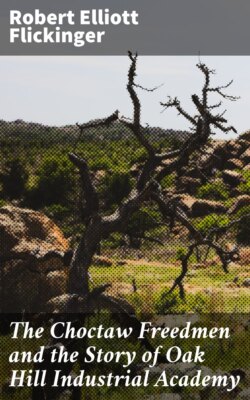Читать книгу The Choctaw Freedmen and the Story of Oak Hill Industrial Academy - Robert Elliott Flickinger - Страница 21
На сайте Литреса книга снята с продажи.
EFFECTS OF THE CIVIL WAR
ОглавлениеAt the outbreak of the civil war in 1861, all of these schools and churches were closed, and the next year the Presbyterian church became divided by the organization of the Southern Presbyterian church, under the corporate name, "The Presbyterian Church in the United States."
At the close of the war it was left to the Southern branch of the church to re-establish this school and church work in the Territory. It undertook to do this and carried parts of it alone for a number of years. The task however proved to be too great; the men and means were not available to re-open the boarding schools, and to supply the churches with ministers. The arrangement was accordingly made for the foreign mission board of the Presbyterian church, to resume its former work as fast as workers could be obtained.
In 1879, four ministers returned and opened six churches among the Choctaws, Creeks and Cherokees.
In 1882 Spencer Academy was re-opened at Nelson, by Rev. Oliver P. Starks, a native of Goshen, New York, who, for seventeen years previous to the Civil War, had been a missionary to the Choctaws, having his home at Goodland.
The Indian Mission school at Muskogee was also re-opened that year by Miss Rose Steed.
In the fall of 1883 the Presbytery of Indian Territory was re-established with a membership of 16 ministers, 11 churches, 385 communicants and 676 Sunday school scholars.
In 1884 Wheelock Academy was re-opened by Rev. John Edwards, who for a couple of years previous, had been located at Atoka. This was a return of Edwards to the educational work among the Choctaws. From 1851 to 1853 he served at Spencer Academy, north of Doaksville, and then from 1853 to 1861 had charge of Wheelock Academy, as the successor of Rev. Alfred Wright, its early founder.
In 1883 two teachers were sent, who opened a school among the Creek Freedmen at Muskogee, known as the "Pittsburgh Mission." A teacher was also sent to the Freedmen among the Seminoles.
After a few years the Pittsburgh Mission was transferred from Muskogee to Atoka, where it supplied a real want for a few years longer. In 1904 when adequate provision was first made for the Freedmen in the public schools of that town this mission was discontinued.
